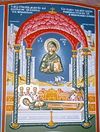

| Previous day | Next day |
| Old Style
September 16
|
Thursday |
New Style
September 29
|
| 16th Week after Pentecost. Tone 6. | No fast.
|
![]() Greatmartyr Euphemia the All-praised, of Chalcedon (304).
Greatmartyr Euphemia the All-praised, of Chalcedon (304).
St. Sebastiana, disciple of Apostle Paul, martyred at Heraclea (86). Martyr Melitina of Marcianopolis (ca. 138-161). Martyrs Victor and Sosthenes, at Chalcedon (ca. 304). St. Dorotheus, hermit, of Egypt (4th c.). New Martyrs Isaac and Joseph, at Karnu, Georgia (808). Martyr Ludmilla, grandmother of St. Wenceslaus, prince of the Czechs (927). St. Procopius, abbot, of Sazava in Bohemia (1053). St. Cyprian, metropolitan of Kiev (1406).
Hieromartyr Cyprian, bishop of Carthage (258). St. Ninian, bishop of Whithorn (Candida Casa) (ca. 432). St. Edith, nun, of Wilton (984).
Thoughts for Each Day of the Year
According to the Daily Church Readings from the Word of God
By St. Theophan the Recluse

Thursday. [Eph. 1:1-9; Mark 7:24-30]
What moved the Syrophenician woman to come to the Lord and be so persistent in her petition? The shape of her convictions which had formed—she was convinced that the Saviour had power to heal her daughter and she came to Him; she was convinced that He would not leave her petition without fulfilment, and she would not stop asking. Convictions are the sum total of all of life, upbringing, current thinking, impressions from surroundings, from teachings received and various incidents and activities in life. One’s thoughts work under the influence of all this, and come to certain convictions. Meanwhile one must keep in mind that God’s truth is everywhere, and from everywhere crowds into the soul of man. Truth lies in the heart of man; God’s truth is imprinted in all creatures. There is God’s truth in the customs and dispositions of man; it is also in his teachings to a greater or lesser degree. But falsehood is everywhere as well. He who is of the truth gathers the truth, and is full of true, saving convictions. Whereas he who is not of the truth gathers lies and is full of false convictions, and fatal delusions. Whether a person is of the truth or not of the truth—let everyone examine for himself; but meanwhile God’s judgment awaits everyone.…
Articles
 Repose of St Cyprian the Metropolitan of Moscow and All RussiaSaint Cyprian, Metropolitan of Kiev and All Russia, was a Serb by origin, and struggled on Mt. Athos. |
 Repose of Saint Cyprian, Metropolitan of Moscow and All RussiaSaint Cyprian, Metropolitan of Kiev and All Russia, was a Serb by origin, and struggled on Mt. Athos. |
 Venerable Edith of WiltonDmitry LapaSt. Edith (also Editha, Eadgyth, Eadgith) was one of the most venerated female saints of England. |








